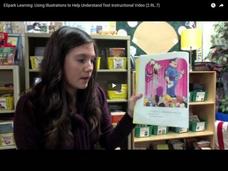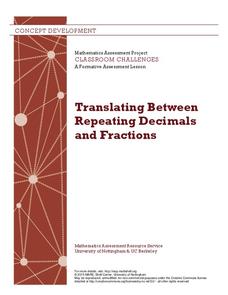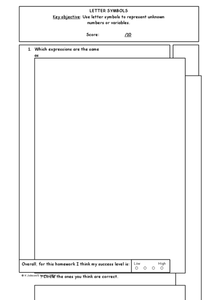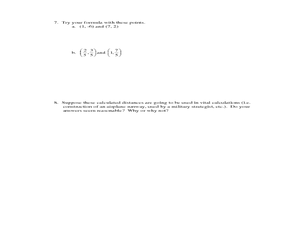Illustrative Mathematics
Fruit Salad
Playing with values in this fruit salad problem allows learners to find out how many cherries were mixed in. Your middle schoolers can organize their thoughts in a chart before going into the equation. Eigth graders can skip the chart...
Software Smoothie
Imagination Box - Colors, Shapes, Numbers and Letters
This app provides young learners with opportunities to be creative while they work with different colors, letters, numbers, and shapes.
Illustrative Mathematics
Temperature Conversions
Complete two conversions at once using compositions. Pupils use the conversion formulas for temperatures to calculate a formula to convert directly between Kelvin and Fahrenheit. Classmates determine the meanings of composition...
Education Development Center
Making Sense of Unusual Results
Collaboration is the key for this equation-solving lesson. Learners solve a multi-step linear equation that requires using the distributive property. Within collaborative groups, scholars discuss multiple methods and troubleshoot mistakes.
EngageNY
Systems of Equations
What do you get when you cross a circle and a line? One, two, or maybe no solutions! Teach learners to find solutions of quadratic and linear systems. Connect the visual representation of the graph to the abstract algebraic methods.
EngageNY
Solving Logarithmic Equations
Of course you're going to be solving an equation—it's algebra class after all. The 14th installment of a 35-part module first has pupils converting logarithmic equations into equivalent exponential equations. The conversion allows for...
Mathematics Assessment Project
Translating Between Repeating Decimals and Fractions
Model for your young mathematicians the process for converting repeating decimals to fractions. To demonstrate their understanding of the process, class members then complete and assessment task and participate in an activity matching...
Mathematics Vision Project
Module 3: Numbers and Operations
Bring some concrete reasoning to the skills of multiplying and combining terms. Using various strategies, the six activities in the module provide practice for the skills of adding, subtracting, multiplying, and diving polynomials. The...
Arizona Department of Education
Introduction to Integers
Welcome to the backward world of negative numbers. This introductory lesson teaches young mathematicians that negative numbers are simply the opposite of positive numbers as they use number lines to plot and compare...
Mathed Up!
Negative Numbers
Eight independent worksheet pages challenge scholars to solve 12 problems that focus on negative numbers in the context of temperature in degrees of celsius.
Education Development Center
Interpreting Statistical Measures—Class Scores
Explore the effect of outliers through an analysis of mean, median, and standard deviation. Your classes examine and compare these measures for two groups. They must make sense of a group that has a higher mean but lower median compared...
Education Development Center
Adding Fractions with Unlike Denominators
If the fractions don't have a common denominator, make them have one. Learners first read and analyze a conversation of pupils trying to add 2/5 and 1/2. They compare the process of adding fractions to the process of adding quantities...
Curated OER
Ratio and Proportion: Write and Interpret
For this ratio and proportion worksheet, students explore example problems. Afterwards, they read story problems and use ratios and proportions to find the solution. This three-page worksheet contains six multi-step problems,
Curated OER
Algebra Applies to the Real World? No Way!
Sixth graders examine the connections between math and real life. In this algebra lesson, 6th graders use Algepairs Cards to complete the problems presented and discuss how algebra relates the real world.
Curated OER
Pizza Topping Combinations
Students brainstorm pizza toppings and determine the number of possible ways to order a pizza. In this algebra lesson, students analyze and investigate geometric patterns as they relate to the concept of a variable. Students then...
Curated OER
Order of Operations
Seventh graders create a mnemonic device which correctly represents the order of operations. They simplify expressions by correctly following the order of operations. Students present their mnemonic device for the order of operations.
Curated OER
Letter Symbols
In this letter symbols instructional activity, students solve and complete 4 different types of problems. First, they circle the expressions that are the same as the one shown. Then, students find the value of each symbol. In addition,...
Curated OER
Real Numbers
In this math worksheet, middle schoolers evaluate the expressions that use integers. They also differentiate between the values of two integers as greater or less than.
Curated OER
Order Of Operation
In this algebra worksheet, students identify the order of operation and the distributive property. They add, subtract, multiply and divide expressions and equations. There are 10 questions with an answer key.
Curated OER
SHHH It's a Secret
Students rewrite word problems using expressions and equations. In this algebra activity, students use the correct variable to solve and write equations. They use the TI to graph their solution.
Curated OER
Words to Numbers
Seventh graders translate word problems into numerical expressions. Through guided practice, 7th graders discover how to take the information contained in a word problem and create a numerical expression using variables. They...
Curated OER
Human Coordinate Plane, Using the Distance Formula
Students write the distance formula to solve equations for finding the distance between 2 points. In this distance formula lesson plan, students also write sentences explaining why their formulas would work.
Curated OER
Math 212: Constrained Multivariable Optimization
In this optimization worksheet, students solve problems using the method of Lagrange. They identify the points and distance from the origin in an equation. This two-page worksheet contains three problems.
Curated OER
Transformations
Learners identify the types of transformations in their lives. As a class, they determine the ones they have control over and which ones they do not. They practice solving problems in math and oral communication that they are faced with...























